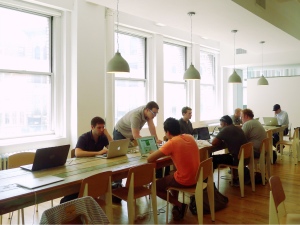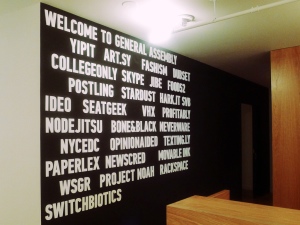 What is a university? There's a legal answer to that question, of course, as well as historical, philosophical, instructional, and civic. And strictly by some of these definitions, General Assembly doesn't qualify as a university. There are no degrees awarded. There is no .edu Web domain. There is no football team.
What is a university? There's a legal answer to that question, of course, as well as historical, philosophical, instructional, and civic. And strictly by some of these definitions, General Assembly doesn't qualify as a university. There are no degrees awarded. There is no .edu Web domain. There is no football team.
And yet the New York City-based organization has a "campus." It offers classes in engineering and entrepreneurship. It even offers certification. And by some accounts at least, what General Assembly offers the New York City community (and soon London, too) is very possibly the future of higher education. At the very least, it could be the future of more informal, lifelong learning.
General Assembly officially opened at the beginning of the year, a self-professed "campus to the public." That campus offers classes on topics like Web design, startup accounting, and product design, tapping into the growing interest -- in New York City as elsewhere -- in technology and entrepreneurship.
But the classes offer something a little different than what you'd find in a traditional university or city college course catalog. Take, for example, Alexis Ohanian's class Making Something People Love. The class will cost you $30 for just one evening's worth of instruction. But for those who are familiar with Ohanian's work -- he's the co-founder of Reddit and Hipmunk -- one evening is a huge opportunity not just for learning from an iconic entrepreneur, but to make important intellectual, professional, and social connections.
 Another factor that makes General Assembly unique is that it offers more than classes. General Assembly has some of the resources you'd expect from a traditional campus -- seminar rooms, classrooms, a media room, a library. But there's also a large communal working area and for a monthly membership fee, students can have access round-the-clock to the work-space. Some startups and entrepreneurs pay an additional fee to rent "office" space (desks really) there. For them, General Assembly is more akin to a startup incubator.
Another factor that makes General Assembly unique is that it offers more than classes. General Assembly has some of the resources you'd expect from a traditional campus -- seminar rooms, classrooms, a media room, a library. But there's also a large communal working area and for a monthly membership fee, students can have access round-the-clock to the work-space. Some startups and entrepreneurs pay an additional fee to rent "office" space (desks really) there. For them, General Assembly is more akin to a startup incubator.

